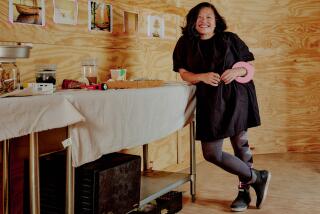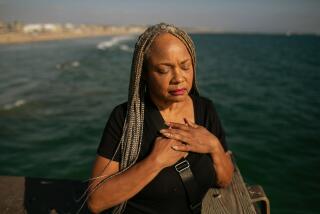Lonely Struggle With Child’s Handicap Destroyed Family
- Share via
Through his sobs, David Phan returns to the same refrain.
“Maybe the government will hear your voice,” he tells me. “I hope that with your article, the government will pay more attention to those retarded, disabled children. . . . Maybe the government might help alleviate the misfortune of the parents of the disabled children. . . .
“I think the government doesn’t understand our situation. Only someone in our shoes would know. The government doesn’t know what having a disabled, retarded child means.”
David Phan expresses this sentiment so often that I no longer record it in my notes. It is a wish that floats up from a father’s deepest grief; it is too unfocused to be called hope.
I have heard this refrain before, from parents of other severely disabled children. Theirs is a lonely, exhausting struggle, they say, full of red tape to get the help they and their children need. It angers many, frustrates them all. Some fight even harder. Some give up.
Stacy Phan, David’s wife, was giving up in steps, but nobody could see where that would lead. She was always quick with a smile, polite, eager to please.
Her life was so sharply focused on daughter Dianna, severely disabled and blind, that the world in the background blurred.
“She shared happiness with other people,” says Chi Phuong Lam, Stacy’s sister. “But sadness she kept for herself.”
Stacy, 32, and Dianna, 4, are dead now. Stacy slipped out of her house with her daughter as the rest of her family--her husband, parents and two older sisters--slept. Then she drove to nearby Westhaven Park in Garden Grove. There she fatally shot her daughter in the head.
After leaving notes in the park for her family, Stacy drove about 6 miles and parked her car near the Garden Grove Freeway. Taking Dianna’s body with her, she walked onto the traffic lanes and lay down. Within minutes, Stacy, too was dead. The driver of the vehicle that hit her has not been found.
Stacy Phan, by all accounts, was not crazy. She loved her daughter, and the rest of her family, more than herself. She and her husband, 41, would talk about having another child, but Stacy resisted. She was afraid a new baby would take time away from Dianna. That would not do.
“Stacy was a darling, darling woman,” says Karen McMillan, principal of Mark Twain Special Center, where Dianna was enrolled for just under a year. “As I told my staff after this happened, this was a beautiful, loving young woman. I firmly believe that what Stacy did, she did out of love.”
Stacy took her daughter out of school this fall shortly after the child’s constant hitting and tearing at her eyes caused her to go blind. Before that, the school recommended that the child be fitted with a protective helmet to prevent her from banging her head on the floor. Dianna reacted with fury; her self-destructive behavior got worse.
When she went blind, splints were made to prevent her elbows from bending, keeping her hands from her face. The helmet and the splints now sit on top of the television set in the living room of the Phan home.
“There is much pain involved in my memory of Stacy and Dianna,” the principal says. “We had no idea that things were that bad. Even when Stacy took Dianna out, the teacher would call once a week to see how everything was. . . .
“I don’t think that Stacy wanted to burden anybody. Stacy never asked for help. She was still new to the system. Unfortunately, it was Stacy’s nature to keep it all in and not to burden anybody. Dianna was her burden.”
And David Phan’s too. Even now, after her death.
“I can never express all of my sadness, all my feelings,” he says. “I can’t make you understand.”
We are at the cemetery now, Westminster Memorial Park. David bought gladiolus, their blossoms a deep pink, en route. He arranges them in water in front of the double grave, lights incense in the Buddhist tradition, and kneels in prayer as he sobs.
He whispers his hope that his wife’s soul will come to rest in preparation for a new life. The way she died may make that difficult, he says. David has asked a Buddhist priest to bless the spot where his wife was killed.
“I think my wife, sometimes, was serious when she would talk about killing herself,” he says. “But I calm her down. I told her that first of all, I have no relatives here--none--so all my love was for her and our daughter.
“I would tell her to calm down, that we have other things to do. Her parents were coming from Vietnam and after that, we would refinance the house and I would go back to Vietnam and give my parents some money. Maybe they would have a business so that they could support themselves. Then I would come back to the United States.
“If the condition of our daughter was the same, then we would all die. I told her, ‘We all live together or we all die together.’ Several times, I told her this. My wife told me, ‘All this misfortune. Let me and the child absorb it. I prefer to let you have a better life.’ I told my wife, ‘I have nobody here with me. Don’t you and the child leave me alone!’ She cried. She told me to try and take care of myself and my mother and father-in-law.”
Sobs obliterate David Phan’s words. He says he feels left behind.
Life was good for the Phans, David says, before the birth of their child. America had offered him and his wife so much: freedom, jobs. They saved enough money to buy a modest house. The Phans even took on American names-- Van Da became David and Lam Si , Stacy--when U.S. citizenship seemed to make their escape from Vietnam complete.
David says that when Stacy became pregnant, however, they were worried just a bit. His wife had been treated for uterine cancer shortly before. But the obstetrician at UCI Medical Center said an early ultrasound test of the fetus looked fine. David says the doctor told the couple they shouldn’t bother with amniocentesis, even though they wanted further assurances that the baby was well.
“The doctor said this, so what could we say?” David says.
He has gone to fetch the ultrasound images of Dianna in the womb. He points at them, hands them to me to examine, as if I might find a clue to the tragedy that has consumed his life. Tears pour from his eyes.
Money was always a problem for David and Stacy Phan after Dianna was born. There seemed never to be enough. (Money, however, was always sent to relatives in Vietnam.) In her suicide note to her husband, Stacy asked that she and Dianna be cremated to avoid the expense of a grave. Her husband ignored this wish.
David works 40 hours a week as a machinist in Irvine. Stacy worked 30 hours a week as a teller at a bank. Together, they earned $2,000 a month. The Social Security Administration said that was too much; it denied the Phans SSI benefits for their child. The couple did not know they had the right to appeal.
Theodora Parnavelas met Stacy at a physical therapist’s office where both women took their children for state-subsidized treatment. Theodora’s son, a year older than Dianna, went three times a week. Dianna went twice.
When Stacy asked about the difference, Theodora says she explained that she had become adept at navigating her way through the system. Stacy clearly was not.
“I must say the services are there,” Theodora says. “They could have been there for Stacy and Dianna. But who was going to offer it to her? Would Stacy have taken it? Can we fault anybody? I don’t know.”
Stacy called Theodora two weeks before she died, to talk about her frustrations, to convey the news of Dianna’s blindness, to ask about Theodora and her son. Theodora suggested that Dianna be put back in school, that she take advantage of that help in these leaner economic times.
“I told her I see a grimmer picture,” Theodora says. “Things are not getting easier. I’m not going to lie. But then I said, ‘Don’t worry. Dianna will find her place in society.’ ”
Which is what Theodora always told her friend. Stacy never believed. What hope David Phan had for this has been lost.
I tell David that he, too, should seek help. I give him names and numbers. He says not yet. He says that he must solve his problems by himself.
More to Read
Sign up for Essential California
The most important California stories and recommendations in your inbox every morning.
You may occasionally receive promotional content from the Los Angeles Times.













